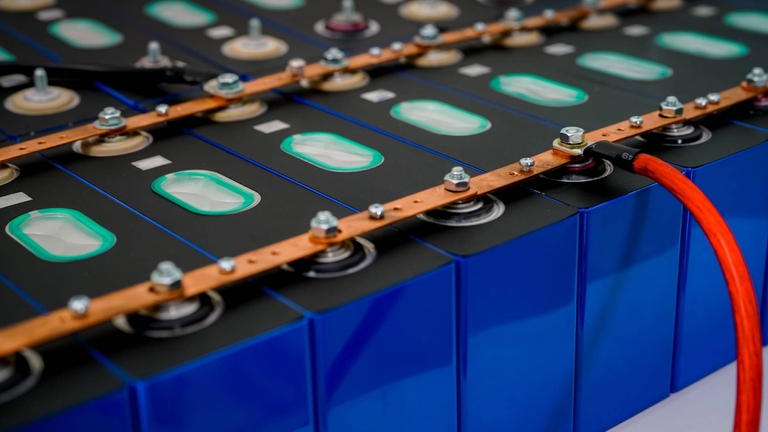https://www.lifegate.it/batterie-accumulo-oltre-litio
- |
Renewable energy is the future, but its large-scale exploitation requires advanced storage solutions.Production from sources such as solar and wind is variable and not always aligned with energy demand.This is where energy storage systems come into play, fundamental for ensuring availability in times of need, reducing dependence on fossil fuels.So far, the market has focused on just one exception:there lithium battery.
But the dominance of lithium-ion batteries in energy storage could soon be challenged by a group of new technologies that aim to store energy for many hours, then much longer.The investigation “Long-duration energy storage cost survey” BloombergNef's report on the costs of long-duration energy storage shows that while most of these technologies are still in their early stages and expensive, some already reach lower costs to those of lithium ions with better performance.

There are storage technologies that are more efficient than lithium
With the increase in renewable energy production, the need to accumulate energy for long periods is growing.Storing energy produced from clean sources to cope with the intermittency of the sources themselves is the main function of storage batteries.According to the Bloomberg study, thermal energy storage systems (Tes:Thermal energy storage) and compressed air ones (Caes:Compressed air energy storage) present themselves as the most economical solutions for long-duration storage, with respective costs of 232 and 293 dollars per kilowatt hour.By comparison, in 2023, lithium-ion systems had an average cost of $304 per kilowatt-hour for a 4-hour run.These new technologies, as well as being cheaper for durations exceeding eight hours, they also offer the possibility of storing energy for up to 24 hours, with margins for extension.
Typically, the unit cost of most long-duration energy storage solutions decreases with each added hour of storage.This applies in particular to TES and CAES systems, making these technologies more efficient than lithium-ion batteries.The latter, in fact, entail a linear increase in costs with the increase in storage hours.Bloomberg's analysis highlights that, except in China where lithium-ion batteries are very cheap, new storage solutions are already more convenient in many markets for durations exceeding eight hours.
Today, regarding lithium batteries, approximately 16 GW are installed worldwide (or 35 GWh:the first measurement, the watt, expresses the power, therefore the energy produced in a second, while watt/hour expresses the energy produced in a given period) of utility-scale systems, i.e. on a large scale, and a target of 63 GW is estimated by 2026;at a European level, in 2021 there will be approximately 4.6 GW (or 7.7 GWh) installed.Considering, however, the entire global capacity installed for all applications - including e-mobility, electronics, residential storage - there are approximately 1,500 GWh.In 2022, global production of lithium cells (also covering the electric mobility sector) has reached 700 GWh/year, with operators active on the market for over 10 years.
And in Italy?
To attract investments in the storage sector in Italy, the Legislative Decree 210/21 introduced the MACSE (Electric Storage Capacity Provisioning Mechanism), a mechanism designed to support the diffusion and integration of renewable energy into the national electricity system, encouraging the development of energy storage capacity.Macse's objective is to ensure that electricity produced in excess during periods of low demand can be stored and then released when demand is high, thus stabilizing the electricity grid and reducing the need to resort to fossil fuels to offset losses. consumption peaks.
Macse involves the awarding of long-term supply contracts through competitive auctions.These auctions are organized by the Arera (Regulatory Authority for Energy, Networks and the Environment) with the support of the GSE (Energy Services Manager) and are managed by Terna, the owner of the Italian electricity transmission network.Operators authorized to build and operate new energy storage systems can participate in the auctions.Macse considers various energy storage technologies, but the selection of eligible technologies depends on their technological and commercial maturity.Currently, therefore, the main technologies included are lithium ion batteries and hydroelectric pumping, ideal for large-scale and long-term energy storage.
- What are hydroelectric pumping? They are an energy storage technology used to store excess electrical energy produced during periods of low demand and release it during periods of high demand.This system uses two water basins at different altitudes and a pumping and generation mechanism.When there is a surplus of electricity, for example during the night when demand is low, this energy is used to pump water from the lower basin to the upper one.This process transforms electrical energy into gravitational potential energy.When demand for electricity increases, water stored in the upper basin is released through turbines that produce electricity while the water flows to the lower basin.This process transforms the gravitational potential energy of water into kinetic energy and then into electrical energy.
But the Macse was also conceived too to promote the adoption of innovative technologies, reserving a 10% share of the procurement quotas for emerging solutions that could prove competitive in the future.This allows new technologies to gradually gain ground in the energy storage market and, should they demonstrate promising results, challenge the dominance of lithium batteries.
